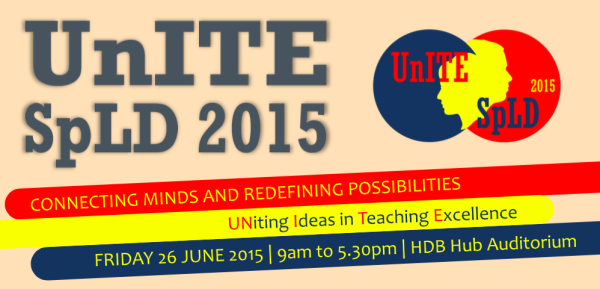NOT JUST FOR SPECIALISTS BUT ALSO PARENTS WHO MAY HAVE A CHILD WITH SPECIFIC LEARNING DIFFERENCES
On Friday, 26th June 2015, DAS Academy are presenting the UnITE SpLD Conference (Uniting Ideas in Teaching Excellence (UnITE) specific learning differences (SpLD). This is the first conference in Singapore targeted at fostering teaching excellence and facilitating professional development amongst specialists in the field of SpLD.
UnITE SpLD Conference 2015 is not only for psychologists, educational therapists and educators in the field of specific learning differences but is also particularly helpful for parents and caregivers of children who need advice and support for their child who may have specific learning differences.
UnITE SpLD 2015 Conference will be held at the HDB Hub Convention Centre, tickets can be purchased HERE
Mr Sim Gim Guan, CEO of National Council of Social Service (NCSS), will grace the event as the Guest-of- Honour and the Conference features distinguished speakers who are equipped with practical knowledge and experience in working with special learning differences.
UnITE SpLD : Plenary Speakers and Topics

1) Noel Chia Kok Hwee Associate Professor, National Institute of Education Nanyang Technological University
Topic: Learning Disabilities: From Operating Definition to Operational Application
This presentation will cover the following learning disabilities: dyslexia, dyspraxia and dysgraphia with a special mention of autism spectrum disorder (ASD). Each of the operating definitions for these learning disabilities and ASD will be examined under the categorisation of four types of characteristics: core, causal, consequential and co-existing/comorbid. From these characteristics, the participants will learn to understand the manifestation of learning and behavioural challenges of each of these learning disabilities. In addition, the participants will learn how to provide targeted intervention via operational application to address these characteristics basing on each of the given operating definitions.
2) June Siew Head of DAS Academy
Topic: The Lens You Use to View Dyslexia and Why It Matters
Does dyslexia arise out of a problem with the individual or society? The deficit-based model focuses on “repairing” the child while the social model focuses on identifying barriers in society and leveling the playing field. These two differing models result in differing provisions for people with dyslexia. While there is still no consensus about the best perspective, it is crucial for educators to understand
that an over-reliance on either could prove to be a disservice to many children with reading difficulties. The presentation culminates in a position that educators should take to promote best practices that will empower those with reading difficulties.
3) Mel Cheang Locum Psychologist, Raffles Counselling Centre, Raffles Hospital Author
Topic: Self-esteem and Dyslexia
The talk will cover a very brief introduction on self-esteem development and its modulation with regard to positive and negative experiences; some findings on self-esteem and dyslexic individuals; and voices from the heart of dyslexic individuals. Ms Cheang will share some interview captions on what some dyslexic individuals say about their self-esteem, and also talk briefly about her experiences on parenting a dyslexic child and relate it specifically to building healthy self-esteem.
Break Out Session 1: 2pm to 3pm
a) Jae Tan Psychologist, Dyslexia Association of Singapore
Topic: Understanding How Assessment Results Can Support Intervention and Learning
Many parents and teachers are often in a dilemma as to whether a child should be sent for formal psychological testing. Concerns range from whether they might be overly anxious with the child’s development, whether the child should get a “label” or whether there can be any benefits from having an assessment. This workshop hopes to allay these concerns by providing parents and teachers a clearer understanding about psycho- educational assessments and how the result of an assessment can further support a child’s learning.
b) Wong Kah Lai Preschool Programme Manager, Specialised Educational Services DAS
Topic: The Importance of Early Intervention of Literacy Difficulties at Preschool: Practical Strategies that Support Teaching and Learning
Language is a tool for communication, be it written or spoken. Listening, speaking, reading and writing are corner stones to language learning. Difficulties in early literacy have a direct impact on children’s subsequent formal learning in school. Early intervention and support can make a significant difference by equipping children with the ability to meet these learning challenges. This workshop aims to equip educators and parents with an understanding of how children learn. It includes practical strategies that adults can apply to empower children to learn effectively and independently.
c) Geetha Shantha Ram Director, MOE-Aided of DAS Literacy Programme DAS
Topic: Learning Through Technology: Why We Need to Believe It for Our Learners
For learners with dyslexia, learning through technology offers the possibility of an independent self- exploration of their individual gifts. And in return it both enables the acquisition of skills and aids in self-confidence. Participants at the workshop will become familiar with current research to guide their efforts to incorporate technology in their instruction. The session will also discuss the applications that may be used with success for learners with dyslexia, and learners’ feedback on their learning journey through technology.
Break Out Session 2: 415pm to 515pm
i. Adam Oei, Ph.D. Lecturer, DAS Academy
Topic: Difficulties in Working Memory in Specific Learning Differences: Strategies to Overcome
Working memory is an important cognitive ability essential for many activities in daily life. Furthermore, individual differences in working memory capacity are highly predictive of educational and occupational success. This workshop is aimed at parents and educators in helping them understand working memory deficits in children with SpLD. Research findings will also be shared with regards to the state of working memory training and what classroom strategies can be used to support children with working memory difficulties.
ii. Michelle-Lynn Yap Director, Continuing Professional Development, DAS Academy and Priscillia Shen Director, Undergraduate Programmes, DAS Academy
Topic: Using Visuals to Develop Critical Thinking Skills
As the saying goes- a picture speaks a thousand words, and thus the value of visuals must not be underestimated. The impact of visual literacy and visual communication is significant in this digital age of information. Humans, especially younger or struggling learners, tend to gravitate more naturally towards visuals than to words. Furthermore, the use of visuals is useful for cross-curricular teaching and allows practitioners to “see [into] students’ worlds, their thinking, and knowledge” (Rowsell, Mclean & Hamilton, 2012). During this session, participants will be introduced to what it means to be visually literate, how it contributes to thinking skills, and its usefulness in home and classroom support.
iii. Hani Zohra Muhamad Educational Advisor, DAS and Anita Pereira Assistant Educational Advisor, DAS
Topic: Social-Emotional Competencies in Children with Specific Learning Differences
Social and emotional competencies are the hallmark of academic achievement as well as successes in life. Today, the importance of being adept at social and emotional skills is a commonly overlooked aspect among children with learning differences. Research shows that children with SpLD who possess a strong foundation in social and emotional skills will cope better in their daily social interactions. This workshop aims to identify areas of social and emotional needs of children with SpLD and share coping strategies for them to manage challenges in school and home
Related articles
- How Does the Dyslexic Child Feel? (bubbamama.com)

